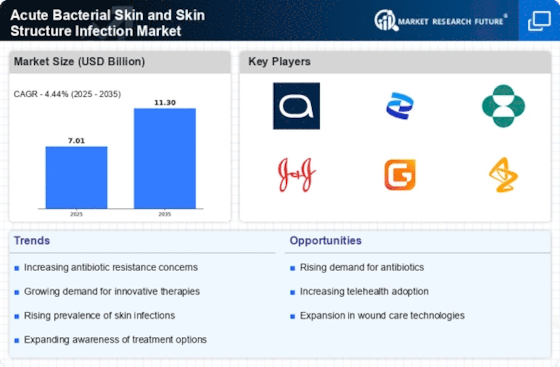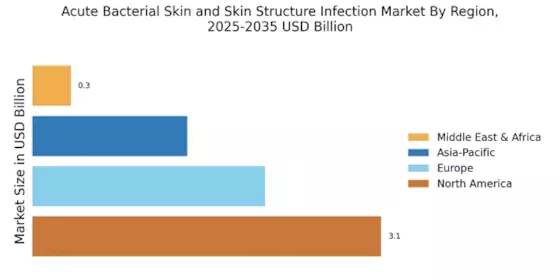Rising Healthcare Expenditure
The upward trend in healthcare expenditure across various regions is a pivotal driver for the Acute Bacterial Skin and Skin Structure Infection Market. Increased investment in healthcare infrastructure and services facilitates better access to medical care, including the treatment of skin infections. As healthcare systems expand, the availability of advanced treatment options and technologies improves, leading to enhanced patient outcomes. Furthermore, higher healthcare spending often correlates with increased awareness and education about skin infections, prompting individuals to seek timely medical intervention. This trend is likely to stimulate market growth, as more patients are treated for acute bacterial skin infections, thereby driving demand for effective therapies and interventions.
Increased Awareness and Education
There is a growing awareness regarding skin infections and their potential complications, which serves as a significant driver for the Acute Bacterial Skin and Skin Structure Infection Market. Educational campaigns by healthcare organizations and government bodies have been instrumental in informing the public about the symptoms and risks associated with skin infections. This heightened awareness encourages individuals to seek medical attention promptly, thereby increasing the diagnosis rates of acute bacterial skin infections. As more patients are diagnosed, the demand for effective treatment options rises, leading to a potential increase in market growth. Furthermore, healthcare providers are likely to prioritize the development of targeted therapies, which could further enhance the Acute Bacterial Skin and Skin Structure Infection Market.
Rising Prevalence of Skin Conditions
The increasing prevalence of skin conditions, such as cellulitis and abscesses, is a notable driver for the Acute Bacterial Skin and Skin Structure Infection Market. Reports indicate that skin infections account for a substantial portion of healthcare visits, with millions of cases documented annually. This rise can be attributed to various factors, including lifestyle changes, environmental influences, and an aging population. As the incidence of these infections escalates, the demand for effective treatment options intensifies. Consequently, pharmaceutical companies are likely to invest in research and development to create innovative therapies. This trend not only highlights the urgent need for effective management of skin infections but also underscores the potential for growth within the Acute Bacterial Skin and Skin Structure Infection Market.
Growing Burden of Antibiotic Resistance
The escalating issue of antibiotic resistance poses a considerable challenge to the management of acute bacterial skin infections, thereby influencing the Acute Bacterial Skin and Skin Structure Infection Market. As bacteria evolve and develop resistance to commonly used antibiotics, healthcare providers are compelled to seek alternative treatment options. This situation has led to an increased focus on developing novel antibiotics and alternative therapies, such as bacteriophage therapy and immunotherapies. The urgency to address antibiotic resistance is likely to drive research and development efforts, resulting in a dynamic shift within the market. Consequently, the Acute Bacterial Skin and Skin Structure Infection Market may witness significant changes as new treatment modalities emerge to combat resistant strains.
Technological Innovations in Diagnostics
Technological advancements in diagnostic tools are transforming the landscape of the Acute Bacterial Skin and Skin Structure Infection Market. Innovations such as rapid diagnostic tests and molecular techniques enable healthcare professionals to identify bacterial pathogens more efficiently. This rapid identification is crucial for timely treatment, which can significantly improve patient outcomes. The integration of advanced technologies in clinical settings is likely to enhance the accuracy of diagnoses, thereby increasing the number of patients receiving appropriate therapies. As diagnostic capabilities improve, the market for acute bacterial skin infections is expected to expand, driven by the need for effective and timely interventions.


















